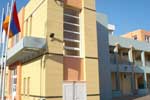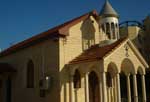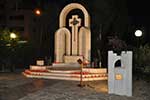Sassounian Column

TURKEY SHOWS INTEREST IN ARMENIAN DEMAND FOR ACCESS TO TRABZON PORT
In a recent column, I reported that Turkey’s Foreign Minister Ahmet Davutoglu had indicated an interest in meeting with “Diasporan leaders” to discuss Armenian demands emanating from the Genocide of 1915.
In response, I suggested that before Armenians consider meeting Davutoglu, he must prove his sincerity by making eight preliminary concessions, one of which is providing the Republic of Armenia special commercial access to the Turkish port of Trabzon.
Last week, the Turkish website Gunebakis and other media outlets reported the positive reaction of Muzaffer Ermish, General Manager of the Trabzon Port: “In a recent article, Harut Sassounian, editor-in-chief of the California Courier newspaper, pointed out that Turkish authorities were actively pursuing the start of a dialog with the Armenian Diaspora, and further contended that they were engaged in a series of meetings ahead of 2015, the 100th Anniversary of the Deportation. Sassounian, who advised the Diaspora not to make conflicting demands from Turkish authorities, listed the demands that a united Armenian delegation could make, including the demand that ‘Armenia be given special commercial access to the Port of Trabzon.’” Gunebakis confirmed that “Trabzon has given a green light to that request.”
However, the General Manager observed: “should the Turkish government provide us with the necessary permission, we are ready. Armenia can easily import and export through this location. The $7.5 billion trade volume of Armenia would be an amazing event for Trabzon." The Gunebakis article, headlined “Armenia’s Eyes are on the Port of Trabzon,” indicated that most of Armenia’s imports and exports currently pass through the Georgian Port of Poti.
Port manager Ermish indicated the benefits of using Trabzon instead of Poti. He pointed out that the distance from Trabzon to Yerevan is 430 kilometers (270 miles). “While the Port of Poti provides the advantage of a railroad link, there is a significant delay in shipments. On the other hand, there is a convenient highway between Trabzon and Yerevan, which is available at all hours of the day. From the Port of Trabzon to Alican [Armenia’s Margara border crossing point] is 400 kilometers, and from there to Yerevan the distance is only 30 kilometers…. Any vehicle that departs from our location will be in Armenia within 6-7 hours, which is an unbelievable advantage for that country," Ermish stated.
The General Manager stressed that “Trabzon’s Port capacity is capable of accommodating new projects," and that "we have increased the capacity of the Port from 3.9 to 10 million tons. We are only utilizing 25% of the Port’s capacity. We are prepared for any commercial opportunity that might present itself regarding Armenia.”
One can draw several conclusions from Port Manager Ermish’s swift and positive reaction:
-- This deal i s in the mutual interest of both Armenia and Turkey. Trabzon would utilize its port capacity more fully, while Armenia would save on cargo handling fees, pay lower freight rates, and gain an alternate land access to the outside world.
-- The General Manager would not have made a public announcement on the sensitive topic of cooperation with Armenia, unless he had advance clearance from Ankara. It is possible that the Turkish government is using Ermish’s positive statements as a trial balloon to gauge the degree of support or opposition to such a move. While there has been no negative reaction from anti-Armenian nationalist circles in Turkey and Azerbaijan, Armenian merchants have welcomed the Turkish gesture.
-- Since the Trabzon Port’s Manager has announced that Armenian cargo can directly cross the currently closed Armenian-Turkish border rather than being rerouted through Georgia, even a limited opening of the border for cargo shipments would eliminate the need for the highly controversial Armenian-Turkish Protocols, once and for all.
Finally, a truly sincere gesture of reconciliation by Turkey would be acknowledging that Trabzon was a major center of extermination during the Armenian Genocide. A monument should be erected in Trabzon Port in memory of thousands of Armenian women and children who were placed in boats and cruelly dumped to drown in the Black Sea.
It should be clear that neither giving Armenia special access to the Trabzon Port nor the erection of a monument could be considered restitution for the Genocide. These are simply steps Turkish officials must take to prove their good faith before Armenians can sit with them at the negotiating table.
By Harut Sassounian
Publisher, The California Courier




















